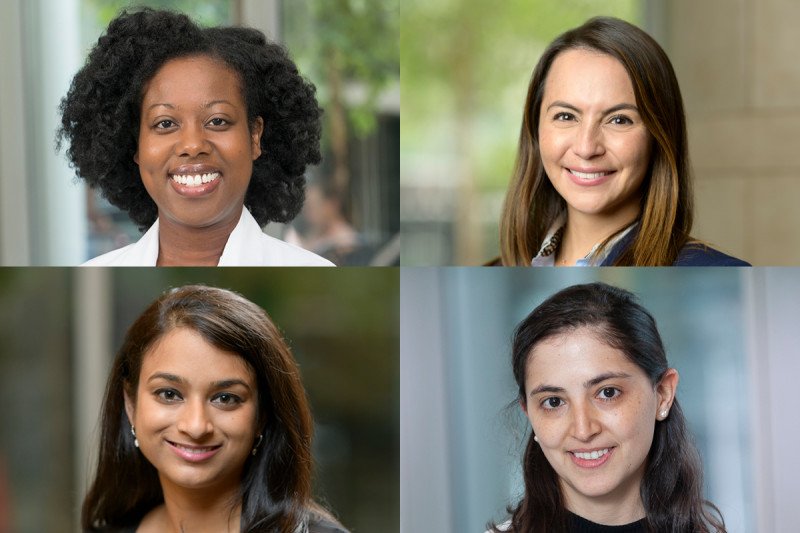
Clockwise from top left: Yolanda Bryce, Fiorella Iglesias Cardenas, Beatriz Wills Sanin, and Sarah Noor
Four MSK physician-researchers were recently accepted into a new career development program that aims to increase diversity in research studies called clinical trials and make clinical research more community focused. Radiologist Yolanda Bryce, pediatric oncologist Fiorella Iglesias Cardenas, dermatologist Sarah Noor, and third-year Department of Medicine fellow Beatriz Wills Sanin will receive two years of support through the Bristol Myers Squibb Foundation (BMSF) Diversity in Clinical Trials Career Development Program.
Nearly every cancer therapy available today was once rigorously tested in clinical trials. Clinical trials offer patients the most innovative treatments — sometimes years before they are more widely available. People of color have long been underrepresented in clinical trials, a reality that makes cancer health disparities even worse.
The new $100 million program, launched by the BMSF with partners National Medical Fellowships and the American Association for Cancer Research, aims to address the lack of diversity in clinical trials in the US. It provides support to early-stage investigators to help them become independent clinical trial investigators who are engaged in advancing health equity through their research and mentoring. The program is available to both physicians underrepresented in medicine and physicians who have a demonstrated commitment to increasing diversity in clinical research.
The program fosters clinical and translational research that is informed by, designed for, and conducted in the community. Participants receive training in evidence-based methods of community outreach and engagement. They also take part in a multilevel mentorship model with established community-based principal investigators and medical students in a related program.
“Commitment to diversity in clinical trials is an important aspect of identifying barriers to treatment and care for patients,” says Dr. Iglesias Cardenas. “I feel humbled and honored to be part of this program, which will help mold me into a clinical trialist and provide the right tools to overcome these obstacles.”
For Dr. Bryce, the program provides a much-needed opportunity to gather data on the incidence and impact of peripheral arterial disease (PAD) in cancer patients, as well as establish the best way to screen for PAD.
“Currently there is severe underdiagnosis and undertreatment of PAD in cancer patients, disproportionately affecting Black patients,” says Dr. Bryce. “My hope is that the findings of an early clinical trial supported by the BMSF program will lead to a large federally funded trial where screening and treatment guidelines can be established in this vulnerable population.”
Dr. Wills Sanin agrees the funding from this program provides an opportunity for critical research in another disease, cutaneous T cell lymphoma (CTCL). “This program gives us the chance to both investigate a new therapy for CTCL and improve our understanding of how race-based disparities impact outcomes for patients with this rare disease,” she says.
As part of its mission to address cancer health disparities, expand access to cancer treatment, increase the participation of diverse patients in clinical trials, and create education and training opportunities for physicians and scientists from underrepresented groups in medicine, MSK’s Office of Health Equity assisted Drs. Bryce, Iglesias Cardenas, Noor, and Wills Sanin in securing their spots in this program. The four women are among the 52 community-oriented clinical trialists who make up the first cohort of early-stage investigators trained through the program. By 2027, 250 clinical trialists will have been trained through the program.